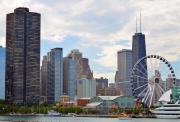Water Conservation Rebates Remain Taxable After Legislation Stalls
Update 2 - August 7, 2022: The U.S. Senate substantially amended and replaced the Build Back Better Act with the Inflation Reduction Act of 2022 (IRA), and the language making water conservation rebates tax free was not included in the IRA. As a result, the legislative proposal to make water conservation rebates effectively stalled. AWE and its partners are considering additional legislative avenues to pursue this important policy objective.
Update 1 - November 19, 2021: On November 19, 2021, the U.S. House of Representatives passed the Build Back Better Act, which includes language to make water conservation rebates tax-free. Homeowners and building/property owners are currently taxed on rebates for making water-saving investments, which increases their costs and discourages these improvements. Language in the Build Back Better Act clarifies that these rebates are not taxable income but rather an effort to defray up-front consumer costs for a public benefit. It would treat water conservation rebates the same as energy conservation rebates, which were exempted from federal taxes in 1992.
AWE has worked for years to make water conservation rebates tax-free, including passage of legislation last year in the House. The Act is currently stalled in the U.S. Senate, but we remain optimistic this tax change will become law.
Original Post - July 27, 2021:Acting on recommendations from AWE and others, on July 22nd Senators Dianne Feinstein and Alex Padilla and Representatives Jared Huffman and Judy Chu (all D-Calif.) introduced the Water Conservation Rebate Tax Parity Act, ![]() which would end federal taxes on utility rebates provided to homeowners for conserving water or improving stormwater management. The bill would result in the federal government treating water conservation rebates the same as energy conservation rebates, which were exempted from federal taxes in 1992.
which would end federal taxes on utility rebates provided to homeowners for conserving water or improving stormwater management. The bill would result in the federal government treating water conservation rebates the same as energy conservation rebates, which were exempted from federal taxes in 1992.
With the current drought already impacting over 90 million ![]() people in the U.S. and with water scarcity likely to get worse because of population growth and climate change, there is an urgent need to encourage water efficiency. This threat goes well beyond the arid west. Thirty-three states
people in the U.S. and with water scarcity likely to get worse because of population growth and climate change, there is an urgent need to encourage water efficiency. This threat goes well beyond the arid west. Thirty-three states ![]() have been hit by drought since 2000, including ones located in the Great Plains, Midwest, Southeast and Mid-Atlantic regions. And scientists warn
have been hit by drought since 2000, including ones located in the Great Plains, Midwest, Southeast and Mid-Atlantic regions. And scientists warn ![]() that most of the country is on pace to experience water shortages if we don’t manage water better.
that most of the country is on pace to experience water shortages if we don’t manage water better.
Unfortunately, homeowners are currently taxed on rebates for making water-saving investments, which increases their costs and discourages these improvements. The Water Conservation Rebate Tax Parity Act clarifies that these rebates are not taxable income but rather an effort to defray up-front consumer costs for a public benefit.





